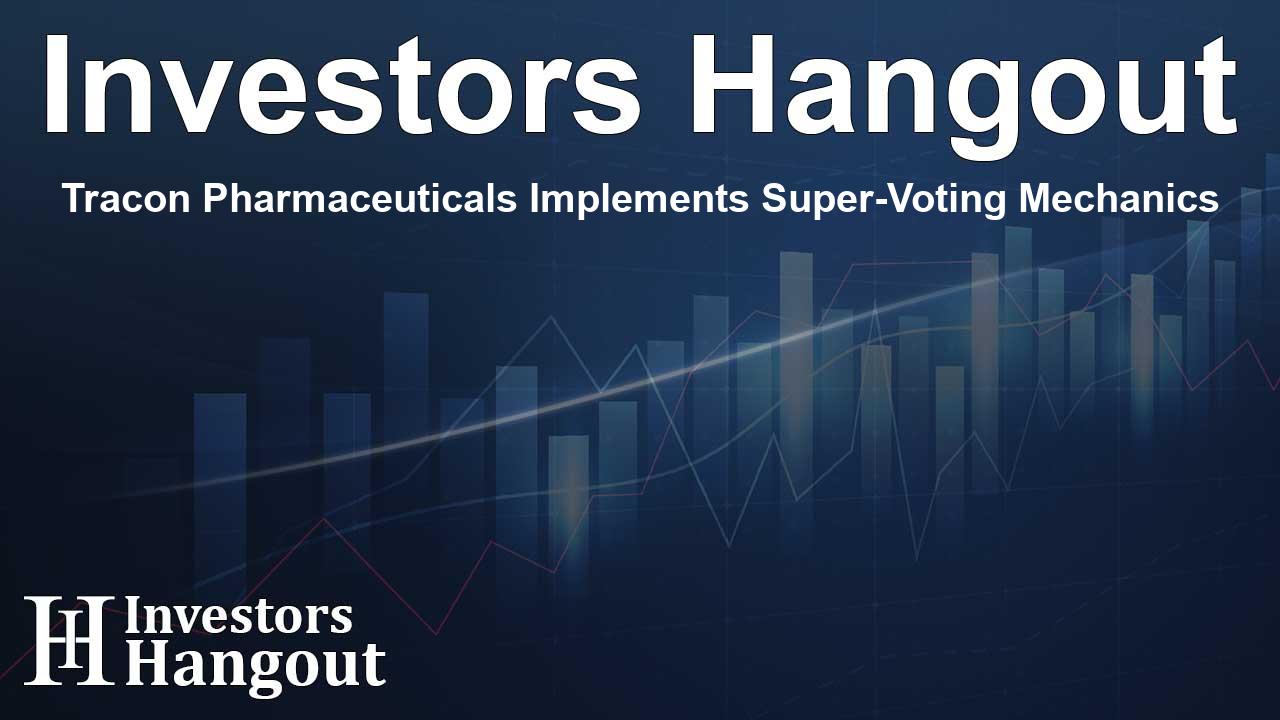Tracon Pharmaceuticals Implements Super-Voting Mechanics

Tracon Pharmaceuticals Enhances Governance Structure
Tracon Pharmaceuticals, Inc. (OTCQB:TCON), known for its innovative approaches in the biotech field, has recently made significant changes to its governance. As part of its efforts to streamline decision-making processes, the company issued a super-voting share to its CEO, Craig R. Jalbert, along with amending its bylaws. This action highlights Tracon's strategy for navigating challenging financial circumstances while aiming to maintain control over its future direction.
Details of the Super-Voting Share Issuance
The issuance involves the creation of a Series A Preferred Stock, referred to as the Super-Voting Share, purchased at a nominal price of $0.01. This strategic move, authorized by the Board of Directors, empowers Jalbert with an extraordinary amount of voting influence during pivotal decisions, such as proposals for liquidation or dissolution of the company. This arrangement strengthens the CEO's control in essential matters, ensuring that key decisions rest with a singular leadership figure.
Implication of the Super-Voting Mechanism
This super-voting share is designed to possess votes analogous to the total number of common shares outstanding under specific conditions, such as during discussions about the company's future viability. Notably, the super-voting share takes precedence over common stock in terms of rights to assets during company liquidation processes. However, it does not include dividend rights and can be redeemed for the original amount at any time by the Board.
Amendments to Bylaws and Quorum Requirements
Alongside the share issuance, Tracon Pharmaceuticals has revised its bylaws, particularly concerning quorum requirements for stockholder meetings. The new regulations state that a majority of the voting power is now sufficient to establish a quorum, shifting the previous need for a majority of shareholdings. This amendment enhances the ability for the company to conduct meetings and make decisions even with limited shareholder presence.
Consequences of Recent Stockholders Meeting
A special meeting of stockholders was also held to deliberate on the proposed liquidation and dissolution of the company. Unfortunately, this gathering did not fulfill the quorum criteria, resulting in the postponement of the meeting to allow more time for shareholders to participate in the voting process. The adjourned meeting is anticipated to occur soon, allowing stockholders to weigh in on critical decisions regarding the company's future.
Financial Context Behind Corporate Decisions
Recent assessments reveal the challenging financial landscape that Tracon Pharmaceuticals is currently navigating. The company’s market capitalization has plummeted to approximately $0.25 million, raising questions about its ongoing sustainability and prompting discussions around potential liquidation. Furthermore, Tracon's reported revenue for the last twelve months totals $3.2 million, indicating a sharp decline of -64.44% in revenue growth, which underscores its operational difficulties.
Operational Challenges and Insights
Tracon Pharmaceuticals is facing significant operational hurdles, with a gross profit margin measured at a concerning -278.31%. These financial metrics underscore the reality of the company's struggles, leading management to carefully consider options regarding liquidation. The insights drawn from recent evaluations suggest that the firm's weak profit margins alongside an unfavorable free cash flow yield are critical factors in these deliberations.
Frequently Asked Questions
What is the significance of the super-voting share at Tracon Pharmaceuticals?
The super-voting share consolidates voting power in the hands of CEO Craig R. Jalbert, allowing him to significantly influence major corporate decisions, including potential liquidation.
How does the revised quorum requirement affect Tracon's governance?
By changing the quorum requirement to a majority of voting power, Tracon can hold meetings and make decisions with fewer shareholders present, potentially streamlining governance processes.
What financial challenges is Tracon Pharmaceuticals currently facing?
Tracon is experiencing severe financial difficulties, reflected in its low market capitalization and sharply declining revenue, leading to considerations for liquidation.
What operational metrics underlie Tracon's decision to issue super-voting shares?
Operational challenges, indicated by a significant negative gross profit margin, have put pressure on management to consolidate power and make swift decisions about the company’s future.
Will the recent stockholders meeting influence Tracon's direction?
The adjourned stockholders meeting allows shareholders to participate in critical discussions and decisions regarding the potential liquidation, shaping the company's future.
About Investors Hangout
Investors Hangout is a leading online stock forum for financial discussion and learning, offering a wide range of free tools and resources. It draws in traders of all levels, who exchange market knowledge, investigate trading tactics, and keep an eye on industry developments in real time. Featuring financial articles, stock message boards, quotes, charts, company profiles, and live news updates. Through cooperative learning and a wealth of informational resources, it helps users from novices creating their first portfolios to experts honing their techniques. Join Investors Hangout today: https://investorshangout.com/
Disclaimer: The content of this article is solely for general informational purposes only; it does not represent legal, financial, or investment advice. Investors Hangout does not offer financial advice; the author is not a licensed financial advisor. Consult a qualified advisor before making any financial or investment decisions based on this article. The author's interpretation of publicly available data shapes the opinions presented here; as a result, they should not be taken as advice to purchase, sell, or hold any securities mentioned or any other investments. The author does not guarantee the accuracy, completeness, or timeliness of any material, providing it "as is." Information and market conditions may change; past performance is not indicative of future outcomes. If any of the material offered here is inaccurate, please contact us for corrections.